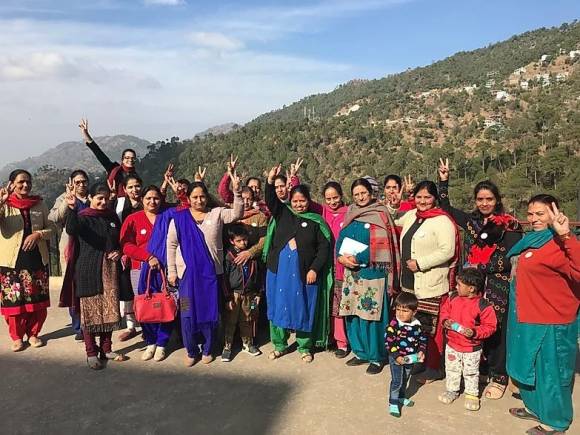Motherhood triggered these three entrepreneurs to create jobs, platforms and opportunities for other women.

Educated young women are often forced out of the labour force after becoming mothers. But these three startup founders reinvented their careers after motherhood, and launched social enterprises that create opportunities, jobs and visibility for fellow moms.

The founder of MUMYU has brought together communities of 450 women for a maternity label
When Shalini Sharma delivered her first child 10 years ago, she was given lots of advice by the older women in her family, which left her awestruck about the tome of traditional knowledge lying untapped. The former recruitment specialist was also frustrated about not being able to find comfortable, functional maternity garments designed for Indian bodies.
Raised in Himachal Pradesh, Shalini used her wide network of connections in the mountains and cities of India to develop a community-based clothing brand, MUMYU, which brings together rural craftswomen with urban consumers while solving a real gap in the market for practical maternity wear for Indian women.
The brand was launched two years ago after Shalini and her team conducted research on 150 pregnant women in Delhi and Gurugram. “The results were amazing,” she says. “Eighty-seven percent of women wanted to buy maternity wear but were skeptical as there was nothing in the market to suit an Indian mother’s body and needs; only foreign branded stores existed. This triggered the idea to create maternity wear for Indian mothers and infant essentials with the help of those who know it the best – the mothers themselves.”
Shalini insists that maternity wear is not fashion – it’s a necessity, a practical need. “It can never ignore or compromise on its function,” she opines. Having worked in the top management consultancies across India, skill-mapping and recruitment training came naturally to Shalini. That is how she managed to spot an opportunity among the women in Himachal.
“These women are extremely talented and highly skilled. They pass on this talent from generation to generation like a legacy. In each household, you will find at least one woman who can either stitch, knit or sew well. But a skill that goes untapped is like an asset wasted,” she says.
Her past work experience also helped her tackle the various challenges the startup faced in its early stages, especially logistics and quality. “We have about 450 women workers in 19 villages in and around Solan district registered with us; they are in the age group of 21 to 68 years. All have different skill sets, different work time preferences, and different challenges. How to get work done in synchronisation with the company’s manufacturing targets was a challenge,” she shares.
The solution lay in community management. Smaller villages were grouped into communities, and one or two women with leadership skills selected to represent each one. “This way we created a few teams of 12-15 women and their team leaders,” says Shalini, explaining that these team leaders were given training in product development. They then trained their respective teams. A similar solution was found for quality management.
“These women don’t see each other as competition, they see each other as friends at work. They share stories, transport, food… This keeps them motivated and connected. This is the biggest strength behind MUMYU,” says Shalini who believes India needs more women venture capitalists to help towards financial uplifting for women entrepreneurs.
She avers, “Women-run businesses are not welfare projects. They are profit-making entities and it’s high time investors make that mental shift.”

The founder of JobsForHer.com is enabling women to restart their careers post-childbirth
An education entrepreneur and a finance and marketing strategist, Neha Bagaria took a career break of more than three years after her two babies were born. During this personal journey, the Wharton School graduate became aware of the various difficulties women face in order to re-enter the workforce.
“I noticed that most of my female friends – all well-educated and experienced lawyers, architects, engineers or MBAs – were stepping out of their careers and not returning to the workforce. When I delved into the reasons behind this female brain drain, it became clear that women face many re-entry challenges that need to be addressed in India. These range from requiring flexibility, regaining confidence, re-skilling, overcoming biases and changing mindsets,” she says.
Second careers are not as easy as the first. Neha was determined to enable other women to restart their careers after she learnt out that 50 percent of working women in India drop out of the workforce in three years. And that’s how her job-search portal JobsForHer was launched on International Women’s Day, 2015.
The Bengaluru-based entrepreneur has faced many stereotypes in her journey, “for example, being a female entrepreneur in tech, challenging the gender biases that exist for mothers in the workplace, being judged for taking career breaks, and then being judged for working full-time despite having little children,” she smiles wryly.
To succeed in the competitive business landscape, it was imperative for Neha to balance her career and other obligations. “For that, I had to build a thick skin and a strong support system, without which I wouldn’t have been able to create the ecosystem required to support this challenging journey to the top. I rallied my troops and got my backbone structure in place – parents, in-laws, extended family, friends, and yes, husband too. And I have been able to stand tall against all odds,” she affirms.
An avid reader and traveller, Neha has found her product-market fit and raison d’etre – to enable Indian women to restart their careers and achieve their full potential.
“We are in the process of launching a new portal with deep technical functionalities to scale rapidly to reach out to women and companies across India. The future we envision and are working hard towards is one in which Indian women will be able to find both personal fulfilment and professional success,” she says.
Inspired by Facebook COO Sheryl Sandberg, Neha is acutely aware how often women hold themselves back because of fears. “It is important to recognise our fears and to name them; only then can we find a path to overcome them. Ask yourself, ‘What would you do if you weren’t afraid?’ We must stride on, confident of figuring things out. Eventually.”

The founder of food-review portal Mishry offers a platform for homemakers and moms to share their food-product experiences
Former editor of NDTV Food Tanu Ganguly wanted to launch her own restaurant before she turned 40. Though that idea fizzled out, she did manage to set up her own enterprise in the food space. “I quit my job of nearly 20 years to set up Mishry.com in April 2019,” she says.
Mishry is India’s first food product reviewing platform that empowers homemakers with a flexible job while engaging their kitchen skills in driving well-informed purchase decisions.
The idea of creating a review platform exclusively for food products struck Tanu while shopping: “All my friends and family take food-related recommendations from me – what’s the best milk for kids? Where should we buy organic veggies from? Or is stainless steel cookware worth it?”
For over a decade, she had informally played the role of connecting people to the brands that she had tried and tasted herself. So the idea of a food-review website felt like a natural fit.
“Your experiences shape your thoughts. And one of the most crucial aspects of being a startup founder should be domain expertise. That deep understanding of how food content works – both from the industry and the user’s perspective – has helped immensely,” she shares.
Of course, she hastens to add, running a startup is a daily hustle. “You have to constantly manage resources, people and expectations to keep moving forward towards your vision. Every decision you make is a first! You don’t always have a template to follow – especially an idea like ours, which is unique,” she says, adding with candour, “While we have been fortunate to have received great traction from users, some days can be really brutal!”
What has kept Tanu going is her ability to stay calm even during the toughest moments of crisis, a skill developed after two decades in the television industry. “I have had many teary moments – but always after the storm is over!” Mishry’s employees are 90 percent women, and most work flexi-hours.
Both Tanu and her husband are “resilient fauji kids” who love to travel and explore local food. As a mom of a nine-year-old, Tanu had always seen women leave their jobs after having kids and so now she tries to consciously hire moms who are looking to get back into the workforce. “This is our small way of making workplaces more sensitive to women in general and moms in particular,” she says.
Article Credit: moneycontrol
